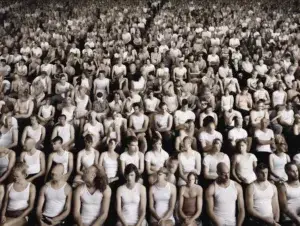
The general slumber of lost democracy
Democracy lost through contempt and abandonment of the will of the people, or how the general drowsiness of contemporary minds is rooted in ultra-normalization, which shaves off rough edges, smoothes out differences and erects conformity as the supreme model. Power structures, whether conscious or not, orchestrate this state of torpor, manipulating the masses by systematically dumbing them down. The citizen, the resigned "sheep", walks with his head down, obsessed by a narrow horizon where the quest for purchasing power becomes thealpha and omega of his life. Sport, used like a modern opium, punctuates the weeks and rhythms the lives of the people, draping them in the illusion of unity and collective fervor, but cutting short any subversive or critical reflection.
Religion's responsibility for democracy lost
As for religion, while it may be on the wane in some contexts, for others it remains a crutch, a refuge. Combined with sport, it forms a cultural cocoon that protects us from the tumult of inconvenient truths. Between these two extremes, the average citizen, addicted to immediate enjoyment and fleeting pleasures, prefers to turn a blind eye to a wider reality: freedoms eroded, injustices rampant, the environment in peril. Beyond the superficial appeal, he focuses on satisfying his primary needs, leaving his mind to be tamed by continuous, restrained stimuli.
Opium through "advertising and entertainment" and general drowsiness
This collective sleep is no accident, but the result of a process skilfully orchestrated by those who hold the keys to power. The system, expert in manipulation, strives to drain energies, dampen outbursts of indignation and channel frustrations into harmless outlets. Permanent distraction, skilfully orchestrated by the flow of superficial information, calibrated entertainment programs or hyper-mediatized sporting events, becomes a tool of control. The citizen, saturated with messages, can no longer distinguish the essential from the trivial; he or she sinks into complacency and repetition, sacrificing his or her ability to understand.
Be normal, think like us
Ultra-normalization is the invisible mold into which everyone bends, without even realizing it. It banishes strangeness, the unusual, differences of opinion, and promises conformity as the only path to social salvation. This process leads to a homogenization of thought and behavior, where the collective is extinguished over the individual to the point of dissolving his or her critical sense. Those who still dare to think differently become outsiders, "troublemakers", branded as pessimists or troublemakers, transgressives of varying degrees of danger.
l-endormissement-general-democratie perdue,

lost democracy, she says
Teaching how to conform
As for generalized dumbing-down, this is rooted in childhood, when educational structures transmit more instructions of docility than the awakening of intellectual curiosity or autonomy. Purchasing power, established as the ultimate goal, sets aside the induced value of culture and the search for meaning, and reduces existence to a market where everything can be bought and consumed. What this cycle of mustiness produces is not just a featureless society, but an alienated world where we prefer to accept dogmas and freedom-destroying laws rather than challenge them, so long as we can enjoy immediate comfort and ephemeral pleasures without hindrance.
Sleep easy
The general sleepiness is gentle, the awakening painful, but it all starts with the ability to open one's eyes to the staging, to emancipate oneself from this orchestrated torpor. Awareness remains the key, an act of intimate rebellion against the steamroller of self-righteousness.
We sleep so well
The orchestrated general drowsiness masks a bitter truth: the renunciation of our own collective destiny. Every minute spent chasing fleeting pleasures, every hour spent losing ourselves in trivia, every day sacrificing our critical faculties, reinforces the straitjacket of indifference. But this state of torpor only benefits those who have a vested interest in it - the manipulators, the profiteers, the architects of illusion. The system keeps them at the top, untouchable, while the public, lulled by empty promises and distracted by brilliant but empty shows, loses sight of the reality of their servitude.
Poor men
Democracy lost through contempt, abandonment of the will of the people and total normalization has a cost: submission to an established order that no one dares to challenge. Permanent entertainment, skilfully dosed, serves as a lure. The masses, reduced to passive consumers, become predictable and freely manipulable. In a world where critical thinking is perceived as a threat, the ability to question is becoming rare. Yet freedom cannot exist without the will to free oneself from mental comfort, to question what the horizons limited by sport and religion, each in their own way, confine the human soul to closed circles.
Circus games
These "recreational horizons" become balms for themind, powerful anaesthetics in the face of the world's grandiose frustrations and inconsistencies. Where it should unite to demand better, we prefer to take refuge in ephemeral celebrations, guided by the promise of transcendence or the adrenalin of temporary victory. Immediate enjoyment, chained to routine, is opposed to the quest for deeper, essentially more uncertain meaning.
A lost battle
Lost democracy is not a simple lack of individual willpower, but a complex mechanism that has forged generations of docile citizens. Every awakening, every realization, is a heroic act, but society has learned to stifle them quickly, to render them inaudible. It is our duty to break this cycle, to create spaces where the spirit can awaken and reflection flourish. We must break the straitjacket of immediacy, of wilful oblivion, and regain control of our thoughts, refusing to be the puppets of a system that thrives on our freedoms.
Preci-precha
But making people happy without their approval is a delicate issue that raises profound ethical, philosophical and even political stakes. This dilemma is based on the tension between collective well-being, as it may be perceived or defined by a minority (leaders, institutions, philanthropists, etc.), and respect for individual autonomy. It evokes the idea that we could impose a version of the "good life" on people without their consent, in the name of their own well-being.
The central brain
The central problem in the so-called lost democracy, however, lies in the definition of happiness and the authority that owns it. Each individual has their own vision of what makes them happy. For some, happiness means security and stability; for others, it means freedom, creativity or spiritual values. When an outside entity claims to know what is "best" for others, it risks depriving individuals of their ability to choose their own path, and imposing standards that can be perceived as oppressive, even if the initial intention seems benevolent.
Back to Mussolini
History is replete with examples of attempts to impose happiness "by force" in the name of ideological or social causes, and these have often resulted in considerable suffering, because they failed to take into account the diversity of human aspirations. Imposed possibility can become a subtle form of control, taking away a person's ability to learn, struggle, make mistakes or grow on their own. It disempowers, leaving no room for authenticity and self-determination.
Happiness, happiness...
On the other hand, it is legitimate to ask whether it is right to remain passive in the face of others' suffering under the pretext of respecting their autonomy. We can act to offer opportunities, improve living conditions, guarantee fundamental rights or open up paths to happiness - but forcing people to take them, even with the best of intentions, can be more destructive than beneficial. We'll have to see.
In short, if you find it hard to see some people living their way and what bothers you, let them live, praying for them. 😊
